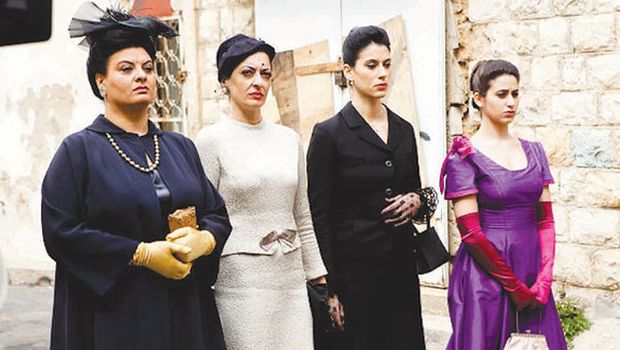
Villa Touma by Suha Arraf (Asharq Al-Awsat)
“I knocked at many Arab and non-Arab doors. Had a single corporation responded, I would not have gone to that fund [NIF]. But what can I do? Arab donors seem to have no objection about me going to the NIF,” Arraf told Asharq Al-Awsat. She added: “As for the media, it is attacking the film aggressively for being funded by the Israeli state.”
This issue has affected other Palestinian film directors in the past, including Mohammad Bakri and Elia Suleiman. There seems to be no Arab cooperation or investment in Arab films directed by Palestinian filmmakers living in Palestine, yet there is a distinct readiness to accuse a film director of “selling themselves” for receiving Israeli funding.
Arraf said: “We Palestinians, whom they call the “Arab citizens of Israel,” constitute 20 percent of the population of the state of Israel, yet we receive only one percent in services and benefits in return for the taxes we pay.”
She added that she felt she was entitled to receive the money: “It is my right which I, as well as other Palestinian taxpayers, have paid. It is the Israeli film directors who benefit from the tax we pay.”
Her words are not meant only for Arab critics, but are also directed at the Israeli media and other government cultural organizations, which demanded that the film director, who was born on the Israeli side of the Lebanese border, refund the money in view of her insistence on submitting the film as a Palestinian production. “They fought me aggressively and mounted enormous pressures on me. I received threats after they called me a terrorist for taking up such a stance. I will not surrender to these pressures. Let them do what they want,” Arraf said.
Villa Touma is different to other Palestinian films, regardless of the director’s view that it is purely Palestinian, and the NIF’s view that it is purely Israeli. It is, however, Palestinian in spirit. This is not because it fails to depict a Jewish or Israeli character, but because it is comprehensive in its view of society. It depicts the life of four female characters from one Christian family: Aunt Juliette (played by Nisreen Faour, best known for her role in the US film Amreeka), her two sisters Violette (Ula Tabari) and Antoinette (Cherien Dabis). The four receive their niece, Badia (Maria Zreik), the daughter of their late brother, in the villa where they live in Ramallah (although the film was shot in Haifa) because she has no one to support her and has outgrown the orphanage.
Juliette and Violette treat Badia with little respect and seem to blame her for her Christian father having deviated from tradition by marrying her Muslim mother. Juliette decides that now is the time to raise Badia’s status in society. The women spend money on the girl’s education to teach her French and even hire a tutor to teach her piano in order to marry her off. Juliette is dedicated to this goal, whereas Violette seems to be indifferent and often shows an underlying bitterness towards Badia. Antoinette, however, as the youngest, is the most sympathetic towards her.
The Toumas begin to attend weddings, Sunday prayers and funerals, although they have never previously socialized with people outside the family to the extent that other Christian families have. As a result, they receive little enthusiasm for their project and no one proposes to the girl.
At one of the weddings they attend, Badia meets a Muslim youth who is brought in as a singer. Defying family tradition, she dances with him and they later begin to meet in secret. She becomes pregnant with his baby, but he disappears, and their affair becomes a scandal two months later. Later on, she discovers that he disappeared because he was killed during a resistance operation against Israel.
Arraf has previously written scripts for Israeli films such as Syrian Bride(2004) and The Lemon Tree (2008). However, this is the first time she has written a script for her own directional work. The result is a coherent subject in terms of the way the actresses handle the characters and the way the director handles them. Villa Touma is a wonderful film in terms of its narration. The film’s only defect—which is not a fault of the director—is that the budget did not allow it to breathe freely during the shooting process, and prevented the application of additional scenes.
For example, we hear that Badia took French lessons but we did not see them take place, and Badia’s singing lessons were cut to appear as if they took place over the course of two or three days, when it was supposed to be much longer. However, the director’s skill was evident in her ability to compromise using carefully studied visual and editing techniques. The first half hour of the film at least is brilliant cinema, and in the remainder the standard of the performances and the skill of the director and the camera do not falter.
